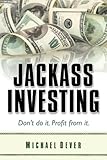Second, the question is "what is risk?" Academics will tell you risk is best proxied by volatility (or some measure derived from volatility.) Buffett will tell you this is bs and risk is essentially unmeasurable but can be hedged against by buying assets that seem underpriced through analysis and leaving a margin of safety in the price you buy the asset such that you can reasonably expect to have your principal returned if things go completely wrong. At the end of the day if you know something other people don't know, or can see things that other people can't see, your investments based upon this knowledge or vision can arguably be thought of as less risky as those done by those who don't have this perspective, even if they are the same investment. It's easy to think you are always going to be on the losing side of the trade but I also think that in certain scenarios, individuals can make good investing decisions if they have some specific domain knowledge. At the end of the day, Wall Street analysts are good at understanding and predicting certain characteristics of future cash flows, but are completely blind to things they didn't learn how to model in business school. The individual investor, particularly one who has deep understanding of specific domains, seems to me to have an advantage in certain trades not just because of their knowledge but because of the smaller position sizes they need to take as well.
This blog post presents conventional wisdom about investing that is generally accepted as "the truth" for people who consider themselves reasonably informed and smarter than people who just gamble on stocks. However there are alternative viewpoints on security selection and overall risk management that stand far afield from the "shut up and buy index funds" camp that are not get rich quick schemes and are worth considering. Stock picking or more active investing in general being a fool's errand is far from a open-and-shut case. Buffett has been saying this for decades and basically makes the claim that every year that these "you can't beat the market, the market is efficient" views get perpetuated and magnified is a gift to those who see otherwise. (And his returns speak for themselves.)
http://www.amazon.com/Quantitative-Value-Web-Site-Practition...
http://www.amazon.com/Expected-Returns-Investors-Harvesting-...
http://www.amazon.com/Jackass-Investing-Dont-Profit/dp/09835...


For a layman's treatment debunking this view (don't mind the title):
http://www.amazon.com/Jackass-Investing-Dont-Profit/dp/09835...
for a more academic flavor:
http://www.amazon.com/Expected-Returns-Investors-Harvesting-...
the best book on stock picking i've read:
http://www.amazon.com/Quantitative-Value-Web-Site-Practition...